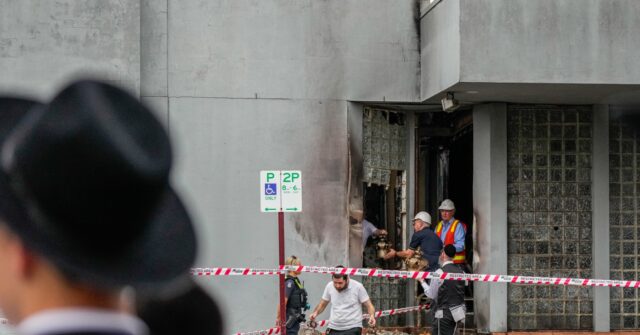On a recent Friday, a devastating arson attack on the Adass Israel Synagogue in Melbourne has sparked national outrage, prompting Australian Prime Minister Anthony Albanese to condemn the event as an act of antisemitism and a violation of Australian values. Witnesses reported seeing two masked individuals spreading a liquid accelerant inside the building early in the morning, leading to a significant firefighting response of 60 firefighters and 17 fire trucks. The motive for the attack has yet to be established, but it is viewed within the broader context of escalating antisemitic incidents across Australia since the onset of the conflict between Israel and Hamas last year, where buildings and vehicles have also been vandalized amidst protests.
Prime Minister Albanese expressed his dismay over the attack, reiterating that attacking a place of worship undermines the fundamental freedoms and rights that all Australians should enjoy. He called for unified condemnation of such violence, emphasizing that acts against any religious community harm the fabric of Australian society. His remarks were echoed by Israeli Foreign Minister Gideon Saar, who described the incident as “abhorrent” and insisted that antisemitism should be confronted relentlessly. The need for swift action from Australian authorities was underscored, reinforcing the imperative for justice against the perpetrators.
In the wake of the attack, Rabbi Gabi Kaltmann of the synagogue urged the community to find solace in congregational worship and the tradition of the Sabbath. His appeal highlighted the resilience of the Jewish community, even in the face of fear and trauma. The incident served as a stark reminder of the ongoing challenges faced by marginalized communities, particularly the Jewish population, which has felt increasingly vulnerable amid rising antisemitism. In response to these hostile sentiments, the Australian government has taken steps to combat hate, including new laws prohibiting the Nazi salute and the display of Nazi symbols.
The local community’s response was swift, with Victoria state Premier Jacinta Allan acknowledging the painful history of the synagogue’s founders, many of whom were Holocaust survivors. She pledged financial support to help rebuild the synagogue, underscoring state commitment to tackle antisemitism. Increasing police presence in the area was also announced, signaling determination to bring the criminals to justice and reassure the affected community of their safety and security.
In a broader appeal for solidarity, Daniel Aghion, the president of the Executive Council of Australian Jewry, called on the wider Australian community to stand against hate and antisemitism. He received support from various communities, indicating a collective rejection of violence and prejudice based on religion or ethnicity. Aghion’s message was clear: the Jewish community should not be left isolated or vulnerable. It is imperative for all Australians to unite against hate-fueled violence and to ensure that such acts are not tolerated on Australian soil.
As the nation grapples with the implications of this incident, it becomes increasingly evident that a comprehensive approach, embracing both strong legal measures and community solidarity, is essential in confronting antisemitism and protecting the rights of all religious communities in Australia. The attack on the Adass Israel Synagogue serves as a troubling indication of rising intolerance, reaffirming the need for ongoing vigilance, engagement, and mutual support among all groups to maintain Australia’s reputation as a diverse and inclusive society dedicated to respecting the rights of every individual.

